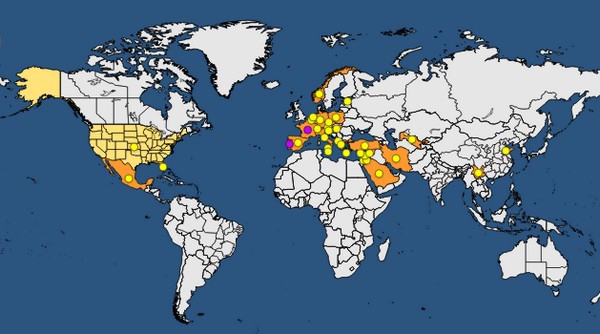The Tomato brown rugose fruit virus (ToBRFV) continues to spread. The Netherlands recently reported that there now are 38 infected companies. Belgium, according to information from the FAVV, now has 15 infected companies. According to the latest update from the European and Mediterranean Plant Protection Organization (EPPO), the virus has also appeared in Albania.
Sampling results Belgium expected
A spokesman for the Federal Agency for the Safety of the Food Chain (FASFC) speaks of 15 officially infected companies in the province of Antwerp. In December there were only 12 contaminations. At that time there were 36 cases in the Netherlands already.
None of the growers in Belgium has yet been declared free of contamination. Growers can only be declared contamination-free if there has been a change of cultivation and the new planting has tested negative. This sampling is done at the request of the grower when the new plans are at least 6 months old. The first applications are expected in the coming months, the spokesperson says.
The Flemish test stations and research institute Scientia Terrae have published a photo database containing pictures of the most important leaf and fruit symptoms in tomato when infected with the Tomato brown rugose fruit virus (ToBRFV). This is an update for February 2022. Click here to access the database.

ToBRFV distribution worldwide, tracked by EPPO.
For an enlarged view, click here.
Bell peppers
The EPPO update also mentions a virus infection in bell peppers (capsicum annuum) in Lebanon in 2020 and in Syria. Sweet bell pepper infections have also been detected in the Netherlands., according to Groenten & Fruit. The grower had switched after contamination. The crop showed no symptoms.
Q-status
The European Union has a quarantine status for ToBRFV. The virus is harmless to humans and animals, but very damaging to tomato and bell pepper crops.
Now that the virus is continuing to spread worldwide, including via seeds -as was demonstrated recently-, this status is under discussion, at least in the Netherlands. For some time, the Netherlands has been arguing for an adjustment to the current Q-status. "With the current Quarantine (Q) status, there are insufficient opportunities to conduct proper research," stated policy specialist Helma Verberkt of Glastuinbouw Nederland in last December's Nieuwe Oogst. "With a Regulated Non-Quarantine Pests (RNQP) status, we can focus more on resistances and green solutions."
